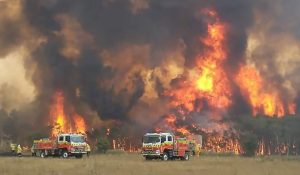The continuing bushfire crisis in Australia has elicited assistance from a number of international partners. Firefighting experts from the United States, Canada, and New Zealand have been working in Australia for weeks. Military support from Singapore and New Zealand is currently being coordinated with the Australian Defence Force (ADF) to identify the best way their assets can be deployed, and over the weekend French President Emmanuel Macron offered operational assistance.
While not wanting to undermine the significance of this assistance, and Australia’s appreciation of it, in many ways these offers are standard for Australia’s bushfire seasons. Australian firefighters reciprocate with their North American counterparts in their times of need, cooperation with New Zealand in disaster management is well-established and intimate, and wealthy and capable countries like France and Singapore are notable good global citizens.
Yet one offer of assistance stands out as having not just the potential to provide much needed help to those communities in Australia currently in need, but also be of significant importance to Australia’s wider foreign policy goals. Over the weekend, Papua New Guinea’s Prime Minister James Marape posted a statement on his Facebook page offering his sympathies and prayers to the Australian public, and also mentioned that he had communicated to Australian Prime Minister Scott Morrison an offer to provide 1,000 PNG soldiers and firefighters to combat the fires and add to relief efforts currently coordinated by the ADF.
For a country that has its own difficulties and limited resources, the offer is an incredibly generous one. Marape’s sentiment that “we offer our hearts and our hands to you in this time of fire induced tragedies” will undoubtedly be appreciated by the individuals directly affected by the fires, the wider Australian public, and the Australian government. But it is the latter that should take serious consideration of the offer, as it presents an opportunity to consolidate its “Pacific Step-Up” by creating a stronger bond between the two countries, and a way of practically enhancing their security partnership with PNG.
Marape’s offer can be seen as a recognition of what potentially lies ahead for the South Pacific. The Pacific Island Forum’s 2018 Boe Declaration identified climate change as the primary security threat to the Pacific. With the region being on the forefront of the effects of climate change, including more intense natural disasters, and several low-lying states facing existential crises, the ability for the region’s governments to be able to coordinate their collective responses will be paramount. The participation of PNG defense forces and disaster relief personnel in Australia’s current national emergency would be a constructive step toward this interoperability.
However, there is also a larger intangible, but equally important, aspect that Australia should consider in regards to Marape’s offer. The dominant lens of Australia’s activity in the Pacific, and the way that Australia’s “Pacific Step-Up” is often framed, is one of Canberra as a benevolent provider and Pacific Island states as passive recipients. While there are obvious imbalances in financial resources and logistical capabilities, there is no such imbalances with a desire to participate and a generosity of spirit. These are equally important features in being able to enhance the region’s productive partnerships.
In accepting Marape’s offer the Australian government would be enabling PNG to be genuine partners, neighbors, and friends. The people of PNG would feel a great sense of pride and dignity in being able to offer their assistance in Australia’s time of need. It would be an act of national spiritual nourishment, as well as a significant bonding experience for the two countries. For Australia there is a great importance in not being dismissive toward offers of help from friends, especially help from friends who may not have the resources of the United States or France but offer their help regardless. This is a greater act of beneficence, and therefore one that Canberra should approach with substantial respect.
The intensity of Australia’s current bushfires is a stark demonstration that it will not be immune from the effects of climate change. This should give the Australian government some greater empathy with its Pacific neighbors in their own vulnerability to more extreme weather events. The empathy toward Australia from the Pacific has been notable, as alongside Marape’s offer Fiji’s prime minister has also written to Morrison offering his country’s assistance, while Vanuatu has donated a considerable sum to the Rural Fire Service. Australia is being presented with an opportunity here to recognize a shared dilemma, enhance the region’s collective response capabilities, and allow the Pacific to engage in an act of friendship. It’s something that the Australian government should give serious consideration.

































